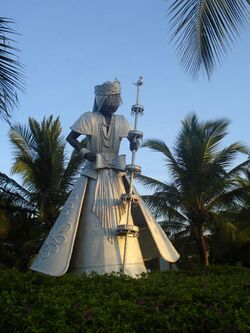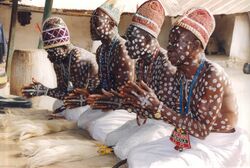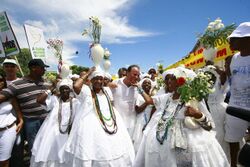Religion:Obatala
This article describes a work or element of fiction in a primarily in-universe style. (May 2018) (Learn how and when to remove this template message) |

Obatala (known as Obatalá in Latin America and Yoruba mythology) is an Orisha. He is believed to be the Sky Father and the creator of human bodies, which were brought to life by the smooth breath of Olodumare. Obatala is the father of all Orishas and the owner of all ori. Any Orisha may claim an individual, but until that individual is initiated into the priesthood of that Orisha, Obatala still owns that head. Obatala's principal wife is yemoja (known as Yemú in Cuba).
Obatala is the second son of Olodumare and was authorized by Him to create land upon the water beneath the sky. Due to his efforts, the first Yoruba city, Ife, was founded. Obatala is Olodumare's representative on Earth and the shaper of human beings.[1]
According to the oral traditions of Ife, the mortal Obatala served as king of Ife during its classical period. His throne was lost to the lineage of his rival Oduduwa at some point during the 12th century CE.
Following Obatala's posthumous deification, he was admitted to the Yoruba pantheon as an aspect of a primordial divinity of the same name.
In Africa
Primordial Obatala
According to the tenets of the Yoruba religion, Obatala is one of the oldest of all of the orishas and was granted authority to create the Earth. Before he could return to heaven and report to Olodumare, Oduduwa, his younger brother (or, in some accounts, sister) usurped his responsibility (due to Obatala's being drunk at the time). He/she took the satchel that Olodumare had given Obatala to aid him in creation, and used it to create land on the primeval ocean. A great feud ensued between the two siblings, and from there came other divinites - Yemoja and Aganju.
Mortal Obatala
Oba Obatala was a king in Ife that was deposed by Oduduwa and his supporters. This is re-enacted every year in the Itapa festival in Ife. Ultimately, following the war between Obatala on the one hand and Oduduwa and his sons on the other, the latter were able to subsequently establish a dynasty with the former's reluctant consent.
It appears from the cult dramas of the Itapa festival that Obatala was a dying and rising god. He left his temple in the town on the seventh day of the festival, stayed in his grove outside the town's precincts on the eighth day, and returned in a great procession to his temple on the ninth day. The three-day rhythm of descent into the netherworld and subsequent resurrection on the third day shows the closeness of Obatala to deities from other traditions that do the same thing, such as Heru.
In the Americas
Santería
Obatalá (also known as Ochalá or Oxalá; Orichalá or Orixalá) is the oldest "Orisha funfun" ("white deity"), referring to purity, both physically and symbolically as in the "light" of consciousness. In Santería, Obatalá is syncretized with Our Lady of Mercy and Jesus Of Nazareth.
Candomblé
In Candomblé, Oxalá (Obatalá) has been syncretized with Our Lord of Bonfim; in that role, he is the patron saint of Bahia. The extensive use of white clothing, which is associated with the worship of Oxalá, has become a symbol of Candomblé in general.[2] Friday is the day dedicated to the worship of Oxalá. A large syncretic religious celebration of the Festa do Bonfim in January in Salvador celebrates both Oxalá and Our Lord of Bonfim; it includes the washing of the church steps with a special water, made with flowers.
Snails
The snail Achatina fulica is used for religious purposes in Brazil as an offering to Obatala. It is seen as a substitute for the African Giant Snail (Archachatina marginata) that is used in Yorubaland, because they are known by the same name (Igbin, also known as Ibi) in both Brazil and Yorubaland.
Oriki (praise names)
- Oluwa Aye - Lord of the Earth.
- Alabalashe - He who has divine authority.
- Baba Arugbo - Old Master or Father.
- Baba Araye - Master or Father of all human beings.
- Orishanla (also spelled Orishainla or Oshanla) - The arch divinity.
- Obatala Oba Tasha, Oba takun takun lóde Ọ̀run - The great king in Heaven.
See also
Bibliography
- Idowu, E. Bolaji: Olodumare: God in Yoruba Belief, London 1962.
- Elebuibon, Yemi: Adventures of Obatala, Pt. 2.
- Lange, Dierk: "The dying and the rising God in the New Year Festival of Ife", in: Lange, Ancient Kingdoms of West Africa, Dettelbach 2004, pp. 343–376.
References
External links
- Santeria cubana :: Tratado de Obatala[yes|permanent dead link|dead link}}]
- Santeria.fr :: All About Obatala
- Santeria.fr :: Todo Sobre Obatala
- Santeria.fr :: Tout sur Obatala



